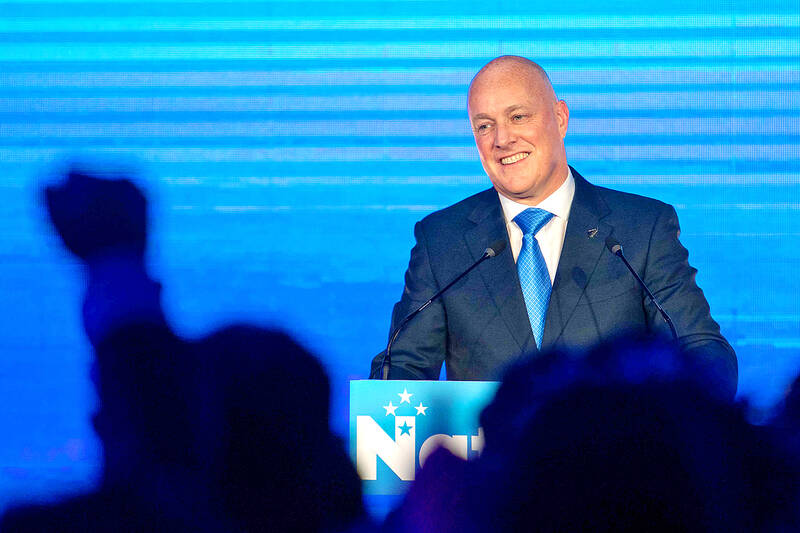New Zealanders yesterday resoundingly elected a new conservative government, with incumbent Prime Minister Chris Hipkins conceding that his center-left Labour party’s six years in power were over.
Hipkins, who replaced charismatic two-term New Zealand prime minister Jacinda Ardern in January, said that he was “not in a position to form a government” and had already congratulated incoming prime minister Christopher Luxon.
“The result tonight is not one that any of us wanted, but I want you to be proud of what we achieved over the last six years,” Hipkins told Labour supporters in Wellington.

Photo: AFP
“On current numbers, it looks like National and ACT will be in position to form the next government,” Luxon added.
With 97 percent of votes tallied, National had 39 percent while Labour trailed on 27 percent.
As the result stood, National could form a government with the support of its ally, the libertarian ACT Party, on 9 percent.
However, they might need the backing of the nationalist New Zealand First party, on 6 percent, to reach a majority in parliament.
Luxon said that New Zealanders had “reached for hope and voted for change.”
The election campaign had been dominated by an increasingly difficult economic situation and a spike in the cost of living that has hit New Zealanders hard.
“My pledge to you is that National will deliver for every New Zealander,” Luxon said, promising to “build the economy and deliver tax relief.”
The 53-year-old, who says he sleeps only five hours a night, completed a rapid political ascent. Only four years ago he was working in the private sector.
He spent seven years as CEO Air New Zealand, and was hailed a future leader upon entering politics in 2019.
In their first 100 days in office, National plan a crackdown on youth offending, a ban on cellphones in schools and a scrapping of the Labour government’s planned fuel tax hikes.
“New Zealanders are going to wake up to not only a new day, but the promise of a new government and a new direction,” Luxon told supporters in Auckland. “I cannot wait to get stuck in and get to work because New Zealand has chosen change and we will get this country back on track.”
Labour’s support has collapsed from 50 percent at the 2020 election, when Ardern led the party to the first outright majority since New Zealand switched to a proportional representation system in 1996.
“I did know when I took on this job that it was going to be an uphill battle,” Hipkins told supporters. “No government has replaced a prime minister in an election year and carried on to win. I gave it my all to turn the tide of history, but alas, that was not enough.”
Additional reporting by Bloomberg

STILL COMMITTED: The US opposes any forced change to the ‘status quo’ in the Strait, but also does not seek conflict, US Secretary of State Marco Rubio said US President Donald Trump’s administration released US$5.3 billion in previously frozen foreign aid, including US$870 million in security exemptions for programs in Taiwan, a list of exemptions reviewed by Reuters showed. Trump ordered a 90-day pause on foreign aid shortly after taking office on Jan. 20, halting funding for everything from programs that fight starvation and deadly diseases to providing shelters for millions of displaced people across the globe. US Secretary of State Marco Rubio, who has said that all foreign assistance must align with Trump’s “America First” priorities, issued waivers late last month on military aid to Israel and Egypt, the

France’s nuclear-powered aircraft carrier and accompanying warships were in the Philippines yesterday after holding combat drills with Philippine forces in the disputed South China Sea in a show of firepower that would likely antagonize China. The Charles de Gaulle on Friday docked at Subic Bay, a former US naval base northwest of Manila, for a break after more than two months of deployment in the Indo-Pacific region. The French carrier engaged with security allies for contingency readiness and to promote regional security, including with Philippine forces, navy ships and fighter jets. They held anti-submarine warfare drills and aerial combat training on Friday in

COMBAT READINESS: The military is reviewing weaponry, personnel resources, and mobilization and recovery forces to adjust defense strategies, the defense minister said The military has released a photograph of Minister of National Defense Wellington Koo (顧立雄) appearing to sit beside a US general during the annual Han Kuang military exercises on Friday last week in a historic first. In the photo, Koo, who was presiding over the drills with high-level officers, appears to be sitting next to US Marine Corps Major General Jay Bargeron, the director of strategic planning and policy of the US Indo-Pacific Command, although only Bargeron’s name tag is visible in the seat as “J5 Maj General.” It is the first time the military has released a photo of an active

CHANGE OF MIND: The Chinese crew at first showed a willingness to cooperate, but later regretted that when the ship arrived at the port and refused to enter Togolese Republic-registered Chinese freighter Hong Tai (宏泰號) and its crew have been detained on suspicion of deliberately damaging a submarine cable connecting Taiwan proper and Penghu County, the Coast Guard Administration said in a statement yesterday. The case would be subject to a “national security-level investigation” by the Tainan District Prosecutors’ Office, it added. The administration said that it had been monitoring the ship since 7:10pm on Saturday when it appeared to be loitering in waters about 6 nautical miles (11km) northwest of Tainan’s Chiang Chun Fishing Port, adding that the ship’s location was about 0.5 nautical miles north of the No.